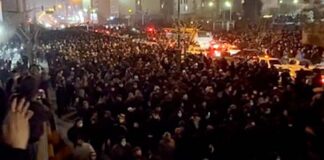A People’s History of the Second World War
By Donny Gluckstein
Pluto Press
$35 from Solidarity
Donny Gluckstein’s A People’s History of the Second World War illuminates a crucial distinction that has long been submerged in mainstream history books. In popular history World War II (WWII) is presented as the triumph of democracy against fascism, a war in which the aims of ordinary people aligned with the ambitions of allied governments. It is this myth of “fundamental unity” that Gluckstein dispels with a detailed study of several cases from Europe and Asia.
Gluckstein shows how the Allies’ “war for democracy” was in fact underpinned by their imperialist interests—maintaining the status quo at home and maintaining their empires abroad. But Gluckstein also shows how the aspirations of ordinary people to fight fascism were motivated by different concerns for democratic rights and social liberation in post-war society.

Gluckstein controversially describes WWII as two parallel wars—an “imperialist war” and a “people’s war”—that at certain points overlapped and other times came into conflict particularly over the nature of the future post-war society.
Ambiguities of the “people’s war”
In order to distinguish between the imperialist war of the Allied ruling classes and the more progressive movements from below, Gluckstein introduces the concept of “people’s war”.
But Gluckstein’s definition of people’s war is vague: “the key thing is not whether or not the war was fought by the people, to a greater or lesser extent, it was fought for the people.” He suggests that the people’s wars were an amalgam of national and class wars, that strove beyond resurrecting the old state and the pre-war social system.
Although intended to clarify the disconnect between the Allied governments’ objectives and the popular resistance to fascism, the concept itself is beset by ambiguities and problems. For instance it is not clear when reading the book what demarcates the people’s war from the imperialist war in the various cases Gluckstein describes.
At some points the people’s war is used as a description of different social classes fighting against fascism in both traditional imperialist armies, and underground armies. At other times, however, he uses it to refer to action led by the working class that confronts the ruling class and the imperialist powers over the nature of the future post-war society.
This creates consequences for Gluckstein’s overrall analysis of the war and the potential for social transformation in the post-war struggles.
Imperialist reality
The Allied war effort is popularly presented as a “good war” in defence of “democracy and freedom” and ridding the world of Nazism, fascism and a continuing Holocaust.
The Second World War is held in high esteem and occupies a privileged place in history unlike other wars in the twentieth century. For millions of workers, the hatred of fascism, with its contempt for democracy and workers’ organisations, inspired a determined and fierce anti-fascist resistance. But Gluckstein shows how imperialist interests shaped and then limited the willingness of the Allied ruling classes to fight fascism.
Prior to the war, instead of assisting the democratically elected government of Spain against General Franco’s fascist coup, Britain and France took a position of “neutrality”. The “Non-Intervention Committee” of 24 countries denied weapons to combatants on both sides, and did nothing to prevent fascist Germany and Italy in backing Franco.
The bankruptcy of the Allies’ “war for democracy” is also revealed by their policy of appeasement in the late 1930s. The policy adopted by Neville Chamberlain and his supporters in the Tory party accommodated Nazism and Mussolini’s fascism, and gave legitimacy to the fascist regimes.
The British government went along with the strategy of appeasing Hitler, conceding the Sudetenland area of Czechoslovakia to Germany in 1938 with the Munich Agreement. They did not declare war until Britain’s own sphere of influence was threatened by the German invasion of Poland in 1939.
Even the Tory non-appeasers, headed by Winston Churchill, were driven by a desire to defend Britain’s empire and its position in Europe, rather than by principled opposition to fascism. In 1942, Tory conservative and Secretary for India, Leo Amery, stated, “After all, smashing Hitler is only a means to an essential end of preserving the British Empire and all it stands for in the world.”
Although he was not as honest as Amery, Churchill’s war speeches and comments were underpinned by the same concerns. He famously said, “We mean to hold our own. I have not become King’s First Minister in order to preside over the liquidation of the British empire”.
Churchill’s calls to enlist the support of Britain’s colonies to fight fascism further exposed the hypocrisy of the Allies’ claims to be fighting for democracy. While happily conscripting Indians to fight the war, Churchill insisted that democracy did not extend to them, at the same time 400 million Indians were suffering from famine as a result of British rule.
In France, sections of the establishment regarded French communists as a greater threat than Hitler and the Third Reich. In 1934, an attempted right-wing coup brought down the French President Daladier. The left responded with mass mobilisations, and a general strike of 4.5 million people followed by more and larger strikes. There were over 12,000 separate strikes in 1936.
On the eve of the Nazi occupation in 1940, the French government launched a witch hunt of French communists and 300 Communist Municipal councils were suspended. Following 11,000 police raids, a ban was imposed on two major newspapers and 159 other communist publications. Elected representatives were expelled from the French parliament and seven Communist leaders were condemned to death.
Confronted with the Nazi military offensive, the French ruling class had a choice between mobilising workers and the wider population to fight the Nazis, or doing a deal with Hitler. They chose the latter. Commander and Chief, General Weygand, told De Gaulle he was ready to capitulate to the Nazis, fearing “anarchy and revolution”.
They handed over 55 per cent of the country to Germany. Marshal Petain collaborated with the Nazis to set up the notorious Vichy government in the South.
The idea that the US and President Roosevelt championed a war for “democracy” is also countered by Gluckstein. One of the chief ironies of US involvement in the war was that the racist social Darwinism that underpinned Nazi racial ideology was alive and well in US society and the military. During the war, leading US military figures restricted the roles for blacks in the Army, arguing they were essentially “agriculturalists” and could not cope with technical modern machinery. Black GIs were even made to sit at the back of transport buses to make way for German prisoners of war.
At home, when asked to back an anti-lynching bill after a spate of horrific racist murders, Roosevelt refused because he did not want to alienate the racist southern Democrats that occupied the US Senate.
Gluckstein also brings to the fore how the Axis powers did not have a monopoly on barbarity. The US bombing of Hiroshima and Nagasaki is a very clear example. But the bombing campaigns by the British RAF on German cities explicitly targeted civilian areas leaving key military installations intact. Three-quarters of all British bombs targeted civilians. The 1944 bombing of Dresden included 19 hospitals and 39 schools killing between 35,000 and 70,000 civilians but only 100 soldiers.
Greece: a “people’s war”?
Gluckstein’s study of the Greek resistance to German and Italian occupation provides an example that contrasts the “people’s war” with the Allies’ imperialist war. Greece was strategically important for the British Empire and entered the war on the side of the Allies despite being under the rule of a fascist government.
The comments of Brigadier Barker-Benfield summed up the British military attitude to Greece. “British troops,” he said, “have two roles, firstly that of hitting the Germans where they are weakest, and secondly, that of ensuring a British military control of the whole country.”
As a result, after Germany occupied the country, Britain favoured the semi-fascist sections of the resistance, such as the National Republican League (EDES) over the progressive organisations such as the National Liberation Front (EAM). The EDES scorned social radicalism and mass mobilisation and instead focused single-mindedly on military combat. Their key slogan was “Faith in the leader. All for the leader. All from the leader”. They were so right wing that one letter from the EDES to the German army stated, “We are not fighting you Germans, we are fighting the communists. We are ourselves true Fascists.”
The EAM, however, waged a distinctive political and social struggle that included holding elections (in which women voted for the first time), educational propaganda, self-government and even the provision of basic services. Gluckstein writes, “By the end of the war EAM claimed up to two million members, and the support of about 70 per cent of the seven million population.”
The EAM was not just fighting the Nazis, it was fighting for a different world. But Britain abandoned support for the EAM altogether once Germany had been defeated. It pushed to reinstate the Greek monarchy, despite the fact that up to 80 per cent of Greece had been liberated by the EAM.
Russia also withdrew support from the Greek Communist Party and the EAM after the war because of Stalin’s deal with Churchill at Yalta to give Britain control of Greece, and Russia control of the Eastern European states.
The British re-occupied Athens in a classic move to re-establish imperial control. Churchill told General Scobie of the British forces, “Do no hesitate to fire at any armed male in Athens who assails the British authority or Greek authority… Act as it you were in a conquered city where a local rebellion was in progress.”
The Allies were brutal. A mass demonstration against the newly-imposed security forces brought Athens to a standstill. Ten people were shot dead and in the next 24 hours the Britsh fired 2500 shells into residential areas causing 13,700 casualties. By the time the December events were over, 50,000 Greeks hand been killed. In 1945, “a right wing reign of terror murdered 1289, wounded 6671, arrested 84,931, and tortured 31,632 Greeks.”
Women who had been radicalised by fighting in the resistance stated, “After the liberation … we who had fought the occupation, we were the bad guys in Greece, and those who collaborated with the Nazis were the good guys”.
Gluckstein concludes, “What happened in Greece was not a difference of opinion within a single world conflict. It was two types of war clashing to such an extent that bombs, tanks, torture, rape and prisons decided the outcome.”
“People’s War” or class war?
Whilst Gluckstein’s book offers an impressive amount of historical material, his use of “people’s war” to understand the material lacks rigour and may be more of a hindrance than a help to understanding the conflict. There is a fundamental question—what constitutes “the people”?
In Greece, for example, is the “people’s war” the cross class anti-fascist war of the EDES and their British supporters, or the conflict that develops between radical sections of the resistance and the British imperialist re-occupation?
Early in the book Gluckstein argues that both those “workers in uniform” in traditional imperialist armies, as well as the underground resistance, should be considered part of the “people’s war” for democracy. But while no doubt many soldiers believed that the Allied armies were assisting the fight against fascism, objectively the actual role of the armies was to pursue the imperialist ambitions of Allied governments.
The people’s war concept misses a crucial component of the struggle against fascism—its class dimension.
In August 1940, Trotsky pointed out the kind of challenge that confronted socialists during the Second World War, writing, “…the feeling of the masses is that it is necessary to defend themselves [against fascism]. We must say: “Roosevelt (or Wilkie) says it is necessary to defend the country: good it must be our country, not that of the Sixty Families and their Wall Street. The army must be under our own command: we must have our own officers, who will be “loyal to us”: In this way we can find an approach to the masses that will not push them away from us, and prepare for the second step—a revolutionary one… I warn you, workers, that they (the bourgeoisie) will betray us! Look at Petain, who is a friend of Hitler. Shall we have the same thing happen in this country?”
In Greece, there were (albeit fragmented) Trotskyist organisations that made similar cases. A 1943 Trotskyist document warned, “The Anglo-Americans will come to hand state power back to the bourgeoisie. The exploited will only have traded one yoke for another.”
But to grasp the significance of the struggle of the mass of Greek workers in the EAM against fascism and against the return of the British requires understanding WWII not as a “people’s war” but as an inter-imperialist war. It was fought by ruling classes against fascism when necessary but always against any radical challenge from below. Sometimes they even enlisted the support of fascist forces to suppress any radical challenge.
In country after country Gluckstein provides examples of how the interests of ruling class war clashed with the interests of the masses who genuinely wanted to fight fascism. But the political question of how the struggle of millions against fascism could have been extended to a struggle against the rule of capital is entirely absent from Gluckstein’s book.
As we have seen in the case of Greece, the possibilities for revolution and workers’ power were not a distant reality or simply a theoretical argument by the end of WWII. In 1943, in both Italy and France, a radicalisation of the working class and the struggle against fascism had also posed the question of workers’ power.
Chris Bambery in his article, “Was the Second World War a war for democracy?” describes French miners’ strikes in 1943 which won increased wages despite arrests and deportations. Four fifths of manual workers in the area were in Communist led groups. In his history of the war, Andre Fontaine writes that in 1944, that power was in the reach of the Communist Party “in various parts of the country”.
Similarly in Italy, in 1943, starting in Turin, over 100,000 workers took strike action. In 1945, 60,000 workers in Milan struck and set up workers councils to run the factories.
Just as the Bolsheviks had turned the horror of the imperialist First World War into a revolutionary struggle in Russia in 1917, the potential for the imperialist war to be transformed into a class war was just as real in WWII.
Gluckstein’s book deserves attention. It brings together a wealth of historical material exposing the imperialist agenda behind the celebrated “good war” that continually floods our television screens, novels and popular culture. It also offers insights into the contradictory class interests of those that fought the war—despite the motivations of those that actually do the fighting, imperialist combat is not the same as class war. The content of the book is far richer than Gluckstein’s formulation of WWII as “a people’s war”.
Jasmine Ali





